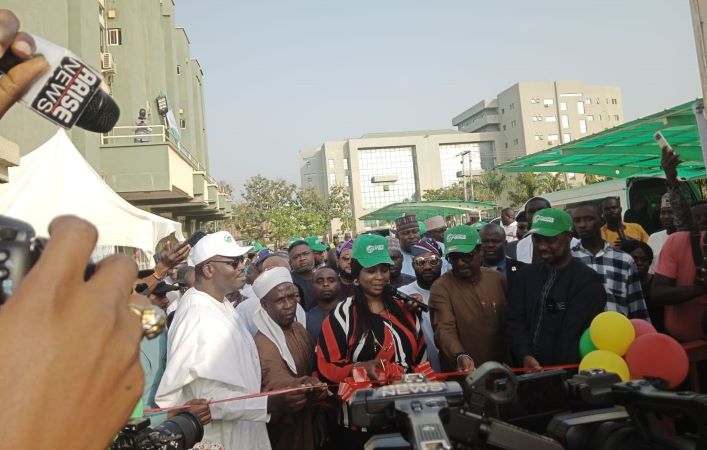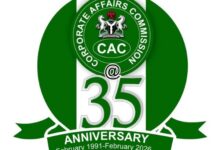Presidency inaugurates Abuja CNG conversion, training centre
 The Presidential Compressed Natural Gas Initiative (P-CNGi), on Thursday inaugurated the Abuja CNG conversion and training centre to ensure the attainment of sustainable energy future in the country.
The Presidential Compressed Natural Gas Initiative (P-CNGi), on Thursday inaugurated the Abuja CNG conversion and training centre to ensure the attainment of sustainable energy future in the country.
BRANDPOWER reports that the centre was commissioned at the Nigerian Institute of Transport Technology (NITT), under the leadership of its Director-General (D-G), Dr Bayero Farah.
In his remark, Mr Zacch Adedeji, the Chairman, Presidential CNG Initiative Steering Committee, said CNG was the way to reduce the cost of transportation.
Adedeji disclosed that the government spent US$ 6 billion to import petroleum into the country annually, “using our dollars and just creating the mess that we have found ourselves in.
“At times for us at the Presidential CNG Initiative Steering Committee, when we are meeting we can’t just understand how it was possible that Nigeria up until today has been buying Petrol for all cars and commercial vehicle when we have gas here.
“And we can use the gas. We can power all our vehicles with the gas at a cheaper and one third of the cost.
“We will not have been spending any foreign exchange, and we will have created all kinds of jobs and opportunities.”
Adedeji, represented by the Senior Special Assistant to the President on Domestic Affairs, Mr Toyin Subair, assured that no monopoly would be created in executing the CNG project across the country.
He said within the next three to five years, Nigeria would be saving US$ 3 million to US$ 5 billion that the country was spending on Premium Motor Spirit (PMS), adding that “we will no longer be buying it.
“We are opening this economy and this part of the sector to everybody in the country. If you are able to set up a conversion centre, we will work with you if you are able to import kits.
“If you organize training for the people, we will start working with you. We are bringing all the banks and all the stakeholders into the sector.
“There is going to be a level-playing field and that is the assurance of President Bola Tinubu on this initiative and we pray to God that it is also going to be extremely successful.”
Also, the Project Director of P-CNGi, Mr Micheal Oluwagbemi, said the event marked a significant step forward in pursuing cleaner, more affordable, and environmentally-responsible energy solutions.
Oluwagbemi, who is an engineer, also said the launching of the P-CNGi-affiliated CNG conversion centre was a conscious choice to embrace cleaner and more affordable energy solutions.
“In a world where the environment is crying out for help, where climate change is an undeniable reality, our decision to adopt CNG technology is not just commendable; it is essential.
“The commissioning of the Abuja P-CNGi Conversion Centre, the second of its kind, after the Lagos State P-CNGi Conversion Centre, represents a profound shift in Nigeria’s approach to energy and transportation.”
He said the initiative, driven by the vision of President Tinubu, was not merely about technological advancements, as the move reflects a fundamental transformation of mindset, habits, and responsibility towards the environment and the nation’s economy.
“The conversion of Petrol Motor Spirit (PMS) vehicles to Compressed Natural Gas (CNG) Bi-Fuel at this facility is a testament to Nigeria’s commitment to mitigating climate change and ensuring sustainable economic growth.
“The Presidential CNG Initiative is aligned with the Renewed Hope Agenda of President Tinubu, emphasising prudence in resource management and dedication to the well-being of the environment.
“I want to express my deepest gratitude to all the individuals, organisations, and partners who have been instrumental in making this launch possible, most especially, our gratitude to Mr. President for deeming us worthy to be executors of his vision for a cheaper, cleaner, safer, and more reliable form of energy for transportation.
“The commissioning of the Abuja P-CNGi Conversion Centre is not the end of the journey, but rather, it marks a new beginning.
“Challenges will undoubtedly arise, but the collective determination, innovative spirit, and collaboration of Nigerians will pave the way for a sustainable, efficient, and responsible future.”
Earlier, the Minister of Transportation, Sen. Saidu Alkali, said studies have shown that CNG could earn the Federal Government over N200 billion from every one million cars if converted.
The minister explained that CNG is cleaner, cheaper and available in the country, adding that it could be used in cars, vans, trucks, motorcycles, buses, trains and ships.
Alkali, represented by Cynthia Ahkidenor, acting Director, Department of Road Transport and Mass Transit Administration, said CNG would also provide the country with energy security.
The minister said the ministry was aggressively involved in the advocacy of engine conversion as an alternative to the removal of fuel subsidy.
“The Federal Ministry of Transportation has been having a series of conversation with relevant stakeholders and transport operators.
“This is in order to get them to buy into the conversation of vehicles to dual engine as a one-off expenditure due to cost of energy.
“The ministry is promoting the rethink compressed natural gas into proper use which is one of the conversation the federal government is involved in as well as being a signatory to the Green House Emission.
“And we have committed to reducing gas from 40 to 60 per cent emission by 2060,” Alkali said.
In his speech, the D-G of the transport institute, Dr Farah, said the launch of the centre marked a significant turning point in the history of transportation in the country.
“We have provided this centre to serve as a conversion centre to all categories of vehicles. Owners will come in to convert their vehicles to CNGs.
“I want to appeal to motorists in Abuja and environs to take advantage of the facilities at this centre to convert their vehicles and enjoy the cheap energy that comes with the CNG,” he said.
BRANDPOWER reports the P-CNGi recently established seven CNG conversation centres across the country.
It said the establishment of the centres symbolised the commitment of the Tinubu administration to spearhead energy revolution in the country.
It assured that more CNG conversion centres would be established across the country, as a pivotal step in the country’s journey towards a cleaner and economically-sound future.











